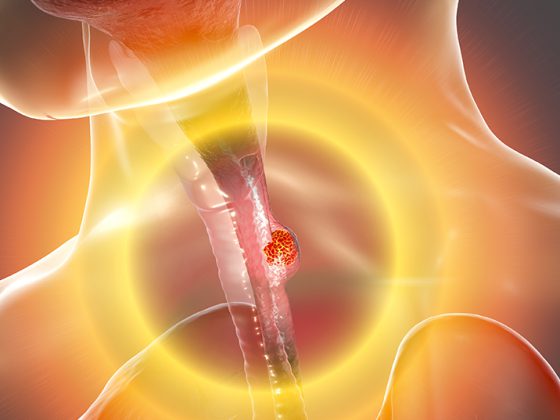Researchers at the Center for Regenerative Therapies Dresden (CRTD) and the Medical Faculty of TU Dresden have identified a signaling pathway that may contribute to intestinal inflammation. They show how a human genetic defect promotes susceptibility for bacteria to trigger inflammation in the gut. Based on this finding, the researchers report potential for new therapeutics.
The causes of inflammatory bowel disease (IBD), which include Crohn’s disease and ulcerative colitis, remain unknown. Although genes have been shown to contribute to the risk of IBD, only a minority of people who carry genetic risk variants develop the disease. This suggests that other environmental factors play an important role in IBD. Researchers at the Center for Regenerative Therapies Dresden (CRTD) and the Medical Faculty of TU Dresden have now identified a signaling pathway that may contribute to intestinal inflammation. They show how a human genetic defect promotes susceptibility for bacteria to trigger inflammation in the gut. Based on this finding, the researchers:in report a potential for new therapeutics. Corresponding active substances can prevent chronic inflammatory bowel diseases in mice that have the described genetic environment. The results were published Nov. 5, 2021, in the journal Science Immunology.
More than 200 different genomic regions are known to regulate risk for IBD. However, the mechanisms controlling the interaction of these risk genes with the environment and the development of inflammatory bowel disease are still largely unknown. “The interplay of genetics and environment makes IBD a very complex and difficult disease to study,” says Prof. Sebastian Zeißig, research group leader at the Center for Regenerative Therapies Dresden (CRTD) at TU Dresden and professor of molecular gastroenterology at the University Hospital Carl Gustav Carus Dresden.
A team led by Prof. Zeißig investigated mutations in the gene X-linked inhibitor of apoptosis protein (XIAP). About 30 percent of all people with this genetic disorder develop IBD, indicating on the one hand a significant genetic contribution to the disease, but on the other hand also showing that other, so far unknown factors contribute to the disease. Prof. Zeißig and his research group have therefore used the example of XIAP mutations to investigate how interactions between genetic defects and environmental influences can lead to the development of IBD.
A genetic defect that disrupts the immune response to bacteria
The scientists observed that loss of the XIAP gene in humans and mice is associated with defects in Paneth cells in the small intestine. “Paneth cells are crucial for controlling the microbiome,” explains Prof. Zeißig. “These cells produce small molecules that act as antibiotics. When these molecules are secreted into the gut, they kill bacteria. In this way, the composition of the microbiome is controlled and bacteria are prevented from invading intestinal tissue.” Without a functioning XIAP gene, Paneth cells showed impaired production and release of antimicrobial molecules. This in turn led to an imbalance in the microbiome.
Gene-environment interactions in the development of IBD.
“The fascinating observation was that the mice did not develop inflammation despite these intestinal defects,” says Prof. Zeißig. Only after the introduction of a specific bacterium that is harmless to normal mice did mice with defects in XIAP develop intestinal inflammation that resembled CED. “This may explain why the majority of patients who have mutations in this gene do not develop inflammatory bowel disease. Although this genetic constellation leads to a more susceptible environment, it is the contact with certain bacteria that ultimately triggers the inflammation,” explains Prof. Zeißig.
Potential for new therapeutics
After observing that loss of the XIAP gene resulted in damage to Paneth cells and an altered microbiome, the team tested a possible intervention. To do this, they reintroduced antimicrobial molecules similar to those produced by healthy Paneth cells to mice with the genetic defect. “We observed that these antimicrobial molecules could prevent intestinal inflammation even when the disease-causing bacteria were present.”
These findings suggest new opportunities for personalized IBD therapies. “It remains to be seen whether the antimicrobial molecules could be a potential therapeutic option, not only for people with XIAP mutations, but also for people with other genetic disorders that can lead to Paneth cell defects and IBD,” Prof. Zeißig added.
Original publication: A. Strigli, S. Gopalakrishnan, Y. Zeissig, M. Basic, Jun Wang, T. Schwerd, S. Doms, K. Peuker, J. Hartwig, J. Harder, P. Hönscheid, P. Arnold, T. Kurth, F. Rost, B.-S. Petersen, M. Forster, A. Franke, J. R. Kelsen, M. Rohlfs, C. Klein, A. M. Muise, N. Warner, R. Nambu, J. Mayerle, H.-P. Török, A. Linkermann, M. H. Muders, G. B. Baretton, J. Hampe, D. E. Aust, J. F. Baines, A. Bleich, S. Zeissig: Deficiency in X-linked inhibitor of apoptosis protein promotes susceptibility to microbial triggers of intestinal inflammation, Science Immunology (November 2021), Link:
https://doi.org/10.1126/sciimmunol.abf7473











